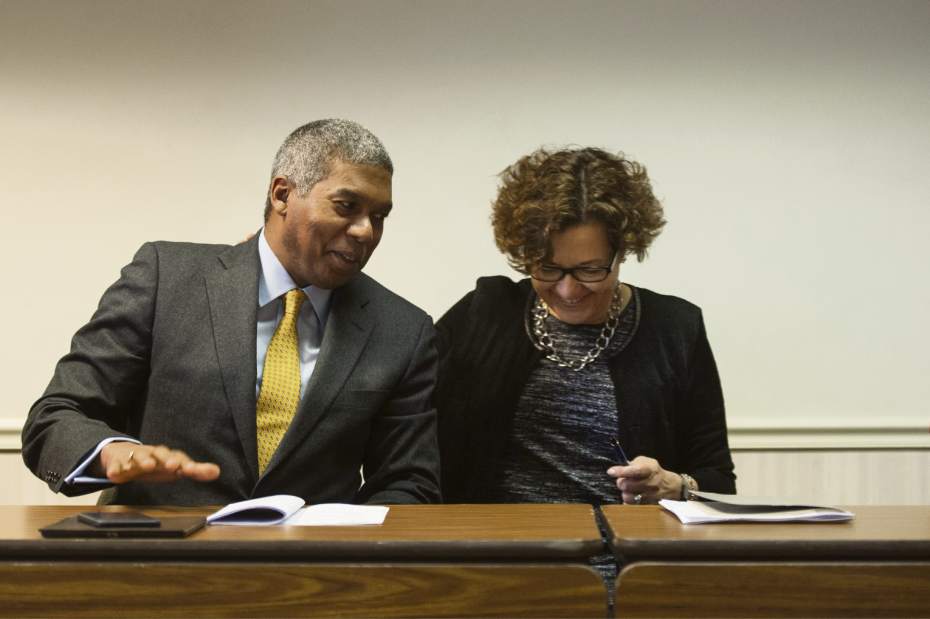Pittsburgh no longer 'financially distressed,' according to state oversight team
Pittsburgh's state-appointed financial overseers Thursday recommended the city's release from state-run fiscal oversight, marking what could be the beginning of the end for the city's “financially distressed” status.
In a report released Thursday, coordinators appointed by the Pennsylvania Department of Community and Economic Development said Pittsburgh has met all requirements to leave state supervision.
Pittsburgh has operated under the Municipalities Financial Recovery Act, known as Act 47, since December 2003 when chronic deficits, overwhelming debt and mounting employee pension costs nearly pushed it into bankruptcy and relegated its rating among credit rating agencies to junk bond status. State lawmakers created the Intergovernmental Cooperation Authority as a second oversight agency to help Pittsburgh avoid bankruptcy.
“The city has strategies in place to address its primary legacy costs — employee pensions, retired employee health care and workers' compensation — while maintaining its workforce and increasing the necessary investment in Pittsburgh's infrastructure,” said the Act 47 team, which is made up of attorneys and financial analysts from Downtown law firm Eckert Seamans Cherin & Mellott in Pittsburgh and Public Financial Management in Philadelphia. “We recommend that the Commonwealth of Pennsylvania rescind its declaration of financial distress for the city.”
Reynolds Clark, who heads the ICA, agreed.
“I think at this point in time, it does make sense,” he said.
Former Mayor Tom Murphy, who requested state intervention to help with Pittsburgh's fiscal problems, said in an interview Thursday that he never thought the city would remain under Act 47 for more than a decade.
He said Act 47 and the ICA did little to help resolve the city's biggest financial challenges: employee pension obligations and a right for police and firefighter labor unions to seek arbitration in contract disputes.
He said lawmakers approved a formula that limited the amounts Pittsburgh and older municipalities receive in state funding for pensions and arbitrators typically side with the unions in contract disputes.
“Neither of those have changed, and they're both drivers on the city that will continue. It will make it very hard for the city to continue to have a balanced budget because of those two drivers,” Murphy said.
“I'm happy to see them go away, but the city fundamentally faces the same challenges.”
Financial recovery plans formulated by the Act 47 team, among other things, placed caps on spending — including raises for union employees — and debt. Employee unions, particularly those representing police officers and firefighters, complained that the city used the plans to hold down wages.
Ralph Sicuro, president of International Association of Firefighters Local 1, said it's time for Pittsburgh to leave oversight.
“It puts us back on an even playing field when we go back to negotiate,” he said, noting that the firefighters' contract expires in December 2018. “Since 2012 when the law was amended, plan deviation was permissible so long as the city had the ability to pay, and the city has had the ability to pay. With or without Act 47 we were not fearing going into negotiations.”
The report notes that the city has eliminated operational deficits, achieved annual balanced budgets and recurring surpluses and paid down debt. Pittsburgh now has policies and management tools in place to ensure future financial stability, it said.
Pittsburgh's release is subject to Democratic Gov. Tom Wolf's approval and that of DCED Secretary Dennis Davin, Allegheny County's former economic development director.
DCED has scheduled a hearing for 3:30 p.m. Nov. 28 in Pittsburgh City Council chambers on the Fifth Floor of the City-County Building, Downtown, to gather public comment on the recommendation.
J.J. Abbott, Wolf's press secretary, said Davin has 60 days following the hearing to review a hearing transcript before making a decision. He said it's too early to say whether the governor would approve of the recommendation.
“There is little doubt that Pittsburgh has transformed its government and institutions in many great ways, including financially,” Abbott said. “Gov. Wolf is proud to work with the city on transforming its economy and improving infrastructure.”
House Speaker Mike Turzai, R-Marshall, who co-sponsored legislation creating the ICA, told the Trib he's not convinced that Pittsburgh is ready to leave state oversight. He noted the Pittsburgh Water and Sewer Authority's chronic billing and debt problems.
Turzai, who is running for in the Republican primary for governor, has co-sponsored legislation that would place PWSA under the jurisdiction of the Pennsylvania Public Utility Commission.
“I think people are not convinced that Pittsburgh has fully turned the corner yet given the evidence we see at the water and sewer authority,” Turzai said. “But I want to see what the finances look like. I think it would be appropriate for the mayor and city council to come up to Harrisburg and talk to us about it.”
The 34-page report arrived Wednesday, three days after Pittsburgh Mayor Bill Peduto, a Democrat, announced during an annual budget speech that he had written a letter to Wolf requesting release from Act 47 contingent upon council passing a series of financial reforms.
The reforms include limiting borrowing to 12 percent of annual operating expenditures, maintaining a minimum yearly fund of 10 percent of operating expenditures and prohibiting any enhancement of employee pension benefits.
Peduto spokesman Tim McNulty said the administration would submit reform legislation to council Monday.
Peduto has proposed a $554 million operating budget for 2018 that includes a $6 million surplus.
Eighteen municipalities across the state, including Pittsburgh, Braddock, Duquesne and Rankin in Allegheny County, operate under Act 47 oversight.
Staff writer Wes Venteicher contributed to this report. Bob Bauder is a Tribune-Review staff writer. Reach him at 412-765-2312, bbauder@tribweb.com or @bobbauder.
Update: This story has been updated to reflect that Pittsburgh's “financially distressed” status began in late 2003.


